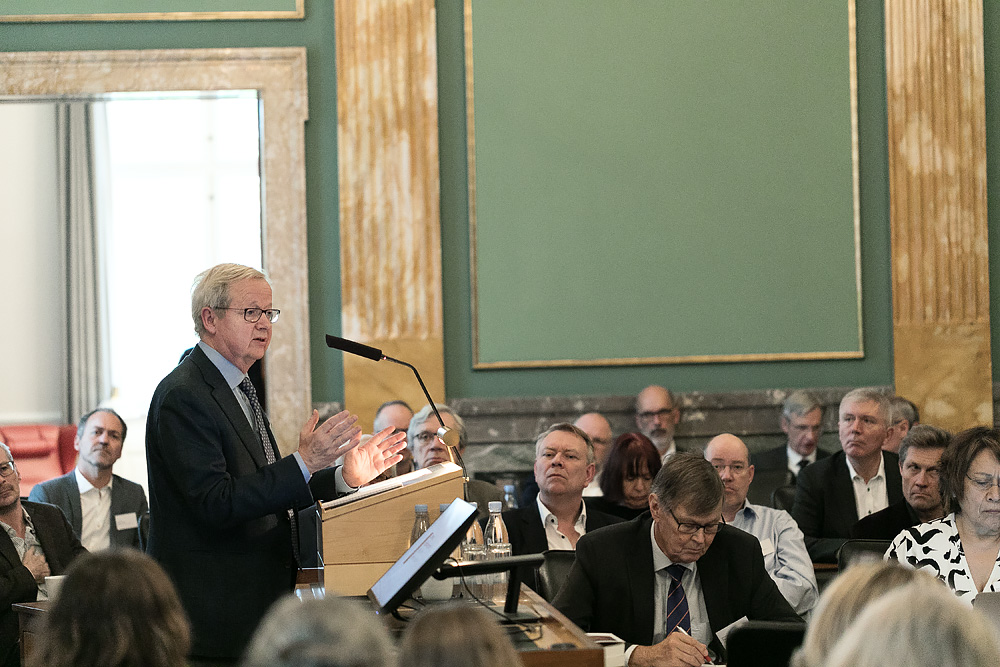
The DNRF’s Annual Meeting 2019: Transformative Research – How, What and Why?
The DNRF’s Annual Meeting 2019: Transformative Research – How, What and Why?
The DNRF recently held its annual meeting 2019. This year’s theme was transformative research. The journey to transformative discoveries and how research policy actors and academia can create the best conditions for transformative research were some of the overall themes of the meeting and the meeting booklet. Read about the meeting and download the booklet here.
On Friday, November 1, the Danish National Research Foundation’s (DNRF) annual meeting 2019 was held on the beautiful premises of the Royal Danish Academy of Science and Letters. This year’s theme was transformative research. The foundation invited DNRF grantees and political stakeholders in Danish research to a day of presentations and debate.
The DNRF’s booklet Transformative Research – How, What and Why? laid the foundation for a discussion of the concept of transformative research. The booklet is based on conversations about transformative research with a number of center leaders from the foundation’s Centers of Excellence; all main research areas were represented. The journey to transformative discoveries and how research policy actors and academia can create the best conditions for transformative research were some of the overall themes of the meeting and the publication.
“What really moves science is incremental research”
The meeting was opened by the chairman of the board of the Danish National Research Foundation, Professor Jens Kehlet Nørskov, who welcomed the participants to the meeting. Next, the DNRF’s CEO, Professor Søren-Peter Olesen, outlined some of the points that appear in the foundation’s booklet.
One of the main points was that it can be difficult to predict what will become transformative in the future, which also became one of the meeting’s most debated themes. Sometimes it only takes a few years before we realize the significance of research; at other times it takes decades. And numerous prior breakthroughs and minor development steps can underpin the research that eventually becomes transformative.
“What really moves science is incremental research. We cannot detect exoplanets without the technology to build space telescopes or the computing power to generate and analyze data. You need to build up the basic knowledge and then develop equipment and technology, and most often transformative discoveries build on large amounts of previous research. Without incremental research, there will be no transformative research, so it is important to discuss how we value research,” said Olesen.
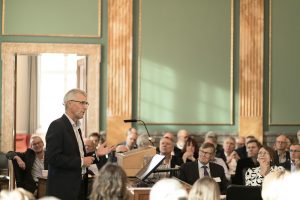
He emphasized that, in this regard, foundations, universities, and politicians should be aware that researchers feel it is considered more prestigious to engage in transformative research than incremental research, which can lead to an unhealthy focus on creating sensational results.
Olesen also highlighted a number of reflections from the center leaders on what can be done to promote transformative research. In relation to the role of universities, it was emphasized that the right environment and a focus on collaborating widely across Danish universities are important factors for new breakthroughs.
Broad responsibility to deliver transformative research
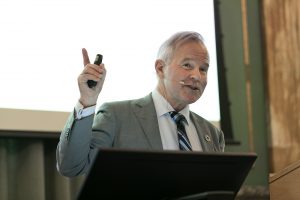
The need for wide collaboration across the different research stakeholders was generally a focal point among the speakers, and the theme was also addressed by the next speaker, Ole Petter Ottersen, president of the Karolinska Institute in Sweden. He pointed out that the need for wide cooperation is an important point, but that it should not be limited to Danish universities and stakeholders. Why not cooperate across the Nordic countries, for example?
In his speech, Ottersen also emphasized the importance of recognizing that there are many actors who must take responsibility for delivering what society expects in terms of creating transformative research. And he agreed that there is a problem in the way we address the concepts of transformative and incremental research.
“To what extent should we, as actors, focus on transformative research? I find that if we place too much emphasis on research to be transformative, then we risk researchers exaggerating the importance of their results,” Ottersen said. He continued:
“Nor should we use the concept of incremental research derogatorily. Very often, incremental research is more important than the original discovery.”
Many factors lead to transformative research
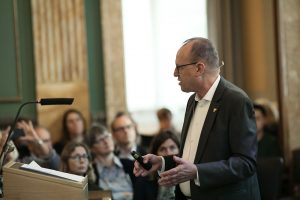
The chairman of the board of the Carlsberg Foundation, Professor Flemming Besenbacher, was the next speaker on the program. In addition to agreeing on the need for a strengthened broad cooperation, he mentioned the great importance of solid infrastructure as well as the composition of talents and skills in the right environments.
Besenbacher also pointed out a need to secure freedom in research and therefore to rely more on the researchers’ abilities, a message that was also highlighted by several center leaders quoted in the DNRF’s meeting booklet.
“There is too much bureaucracy. We need to rely more on the scientists. Trust is declining, and we need to get that trust back into our system and society so we can focus on research and innovation,” said Besenbacher.
In her speech, Professor Marie-Louise Nosch, a former head of a Center of Excellence, also pointed out that access to data and a sometimes unorthodox approach are important prerequisites for transformative research.
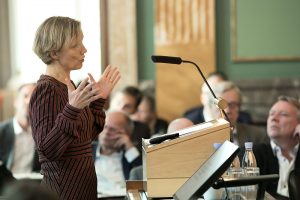
“At the moment, in the humanities and social sciences, we are experiencing many major transformations, which may at times seem daunting, but I also believe it helps raise the bar for the research outcome,” Nosch said.
Here she referred to three points: political and societal expectations of relevance; new types of collaboration with more contact with stakeholders such as municipalities, schools, media, NGOs, and companies; and digital databases and infrastructure that today enable both citizens and researchers to access and use unprecedented amounts of data.
Strategic basic research
The second session of the meeting focused on how to strategically make research transformative for society. The session was initiated by the DNRF’s Chairman of the Board, Jens Kehlet Nørskov, who presented the recently launched funding initiative called Pioneer Centers. This is a basic research initiative with a strategic aim created as a collaborative effort between the DNRF, the Carlsberg Foundation, the Lundbeck Foundation, the Novo Nordisk Foundation, and the Villum Foundation. Together, the foundations will fund the initiative with 1 billion DKK, which will result in centers that carry out basic research focused on the two main areas of AI and climate/energy.
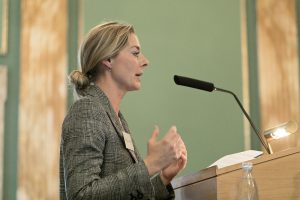
The initiative was praised by the meeting’s next speaker, Mette Fjord Sørensen, head of research at the Confederation of Danish Industry (DI). In her speech, she emphasized that knowledge is our greatest resource in Denmark.
“We sometimes forget the most important thing when debating research – namely, solving problems. We need pioneering and fundamental research, because if it is not present, there is no applied research. But we need a closer link between the pioneering fundamental research and the solutions that companies can rely on. In other words, we must show that there is a ‘return on investment’ in Danish research,” Fjord Sørensen said.
Strategic research should not harm risk taking
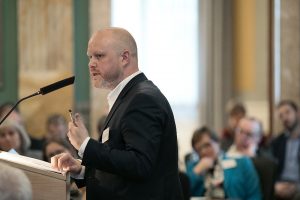
Although the speeches throughout the day talked about a need for strategic effort if we are to solve the major international challenges, and for close cooperation between research and industry, if Denmark is to be a research leader in the future, we must be careful not to shut down ideas with great potential, especially in regard to public money. This was the main issue in the speech by Professor David Dreyer Lassen, chairman of the board of the Independent Research Fund Denmark (DFF), whose speech was based on a report on risk willingness, which DFF and the Think Tank DEA recently published.
“We need to reassess the way we measure and reward researchers, and we need to increase risk-taking. There must be room for flexibility in grants, room to go new ways, to fail and to restructure along the way within the framework of the grant,” said Dreyer Lassen.
He thus talked about another of the main points of the meeting booklet, a point that Søren-Peter Olesen also addressed in his speech earlier in the day. In relation to promoting transformative basic research, several of the DNRF’s center leaders have called for more high-risk funding, long-term grants, and a focus on funding interdisciplinary projects and talent development.
Research with an aim
The last speaker of the day was Birgitte Nauntofte, CEO of the Novo Nordisk Foundation. Like several of the meeting speakers, she pointed out that focused research – including focused basic research – can be a good initiative and that private foundations have options that public funds don’t have.

“It is important for me to emphasize that we are a supplement to public funds. Public and private foundations have many things in common and play on the same piano, but we also have our own role to play. As a private foundation, we can build on top of the strong basic research that is secured by the public funding, and we can be very strategic and focused in selected disciplines,” Nauntofte said.
For the Novo Nordisk Foundation, it is also important to talk about “research with an aim” when grants are awarded.
“I think you can argue that all research has an aim – it starts somewhere. It all comes down to how specific that aim is and how much focus there is on the transformative perspective. When we talk about basic research with an aim in the Novo Nordisk Foundation, we mean high-quality research that has the potential to lead to new treatments and solutions that benefit society. In other words, you can call it research with a transformative potential.”
Further reading about the DNRF’s annual meeting 2019 can be found at Science Report here (in Danish)
